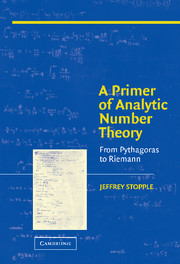Book contents
- Frontmatter
- Contents
- Preface
- Chapter 1 Sums and Differences
- Chapter 2 Products and Divisibility
- Chapter 3 Order of Magnitude
- Chapter 4 Averages
- Interlude 1 Calculus
- Chapter 5 Primes
- Interlude 2 Series
- Chapter 6 Basel Problem
- Chapter 7 Euler's Product
- Interlude 3 Complex Numbers
- Chapter 8 The Riemann Zeta Function
- Chapter 9 Symmetry
- Chapter 10 Explicit Formula
- Interlude 4 Modular Arithmetic
- Chapter 11 Pell's Equation
- Chapter 12 Elliptic Curves
- Chapter 13 Analytic Theory of Algebraic Numbers
- Solutions
- Bibliography
- Index
Chapter 5 - Primes
Published online by Cambridge University Press: 05 September 2012
- Frontmatter
- Contents
- Preface
- Chapter 1 Sums and Differences
- Chapter 2 Products and Divisibility
- Chapter 3 Order of Magnitude
- Chapter 4 Averages
- Interlude 1 Calculus
- Chapter 5 Primes
- Interlude 2 Series
- Chapter 6 Basel Problem
- Chapter 7 Euler's Product
- Interlude 3 Complex Numbers
- Chapter 8 The Riemann Zeta Function
- Chapter 9 Symmetry
- Chapter 10 Explicit Formula
- Interlude 4 Modular Arithmetic
- Chapter 11 Pell's Equation
- Chapter 12 Elliptic Curves
- Chapter 13 Analytic Theory of Algebraic Numbers
- Solutions
- Bibliography
- Index
Summary
A Probability Argument
After this long detour through calculus, we are ready to return to number theory. The goal is to get some idea of how prime numbers are distributed among the integers. That is, if we pick a large integer N, what are the chances that N is a prime? A rigorous answer to this question is hard, so in this section we will only give a heuristic argument. The general idea of an argument based on probability is very old. Not only is it known not to be a proof (Hardy, Littlewood, 1922), but the way in which it fails to be a proof is interesting.
Because this will be an argument about probability, some explanation is necessary. If you flip a fair coin twelve times, you expect heads to come up about 6 = 12 × 1/2 times. You can think of this 6 as 1/2 + 1/2+ ⋯ +1/2, twelve additions. If you roll a fair die twelve times, you expect to roll a five about 2 = 12 × 1/6 times. The 2 is 1/6 added twelve times. This tells us what to do when the probability changes from one trial to the next. Imagine an experiment in which, at the kth trial, the chance of success is 1/k. If you repeat the experiment n times, how many successes do you expect? The answer is 1 + 1/2 + 1/3+ ⋯ +1/n = Hn. Because we already know that the Harmonic number, Hn, is about log(n) in size, we expect log(n) successes after n trials.
- Type
- Chapter
- Information
- A Primer of Analytic Number TheoryFrom Pythagoras to Riemann, pp. 96 - 110Publisher: Cambridge University PressPrint publication year: 2003



